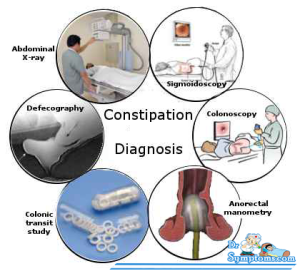The doctor-patient conversation
Initially the detailed interview with the doctor is the first step. Even if it is a taboo subject and many difficult to talk about their bowel movements, you should answer the questions of the physician as detailed as possible. Only he has the chance to make a correct diagnosis and, where appropriate, to initiate the necessary treatment steps.

What questions will the doctor ask ?
Among other things, the doctor will ask about …
- Frequency and type of bowel movements
- Other symptoms such as pain or bloating
- Taking medication
- The eating habits
- Already known basic diseases and incompatibilities
- Worsening of symptoms with stress or psychological distress
Methodology Overview For Constipation
Based on this first conversation the doctor, use various available research methods for further examination. Which method comes in the application in addition to the physical examination, the physician decides mainly in regard to the apparent symptom, as well as on the age and sex of the patient.
- Physical examination of the abdomen (scanning, interception, tapping)
- Blood test (determination of possible hormonal disorder such as low thyroid activity)
- Hemoccult – test for blood in the stool (detection of non-visible blood in the stool)
- Colonoscopy (recommended particularly in patients over 50 years)
- Ultrasound examination (detection of unusual amounts of gas and possibly pathological changes in the gastrointestinal area)
- Examination of the pelvic floor (with magnetic)> determining a possible pelvic floor weakness as the cause
- Investigation to establish the constipation. Here special beads are administered in X-coated capsules and radiographs is determined whether these capsules have not yet passed through the intestine after 72 hours.





